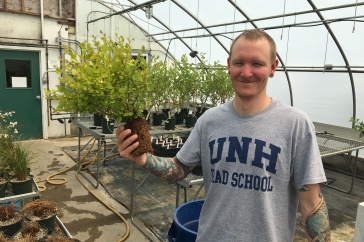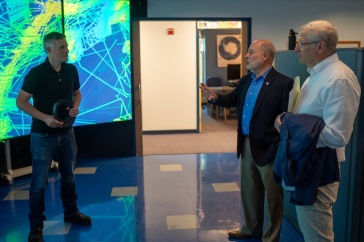
Heidi Asbjornsen, associate professor of natural resources and the environment.

Researchers from around the world are turning to the findings of scientists with the College of Life Sciences and Agriculture (COLSA) as they work to solve some of the most critical agricultural and environmental issues facing the planet. Nearly 40 percent of the current and former UNH scientists recently listed among the world’s leading researchers are associated with the college, with the majority funded by the New Hampshire Agricultural Experiment Station.
A recent study published in PLOS Biology Journal ranked more than 6 million researchers in 22 disciplines and 176 subdisciplines based on citation metrics from 2019 data. Citations — references to source information upon which new research is built — are an important metric for academic research productivity. The number of citations can indicate the impact of research on one’s field; researchers whose work is highly cited can be considered to contribute fundamental knowledge to a field of study. The metrics underscore how UNH researchers are moving science forward on a global scale as they address critical issues facing New Hampshire and New England.
“It is clear that our faculty are thought leaders in their research and respected by peers around the world. Recognizing the many career stages represented by our faculty members on this list, it is also telling of how the research strength of the college has been, and remains, a priority in delivering on our academic missions,” said Anthony S. Davis, dean, College of Life Sciences and Agriculture.
The list includes 46 current, former, and emeritus UNH researchers among the top 100,000 researchers—the top 2 percent—based on their career-long impact in their discipline. Of those, 18, or 39 percent, are associated with the College of Life Sciences and Agriculture. And on companion list ranking the citation impact during a single year (2019), 15 of the 44 UNH researchers, or 34 percent, hail from the college.
Within the college, 61 percent of those noted for their career-long citation impact and 80 percent of those highly ranked for their impact during a single year received funding from the New Hampshire Agricultural Experiment Station. For many scientists, the station provides initial support for new, higher-risk research that can eventually lead to more expansive and impactful research programs.
“While all of the station's research is inspired by questions and challenges faced by Granite Staters, our scientists help benefit not only New Hampshire, but are trusted and move scientific progress forward all over the world,” said Anton Bekkerman, associate dean and director of the NH Agricultural Experiment Station.
Researcher Serita Frey, professor of soil microbial ecology, was noted for her career-long impact to her field. Her research looks at microorganisms in soil and how they respond to environmental changes caused by human activities. Specifically, she and her lab are interested in how climate change, nitrogen deposition, agricultural management, and invasive species affect the composition and diversity of soil microbial communities and microbial-mediated carbon and nitrogen cycles.
“Experiment station support has resulted in multiple publications, which have contributed to my overall citation rate and ranking. This support also has been critical for generating data to use in proposals for federal funding, leading to nearly $5 million in federal support for my research program during my tenure at UNH. That represents more than a 12:1 leveraging on experiment station dollars, which seems like a pretty good return on experiment station spending,” Frey said.
Heidi Asbjornsen, associate professor of natural resources and the environment, works on assessing the effects of drought on New Hampshire’s forests. This work will “increase our understanding of the resilience and adaptive capacity of New Hampshire’s forests to more frequent extreme droughts in the future,” Asbjorsen said. Subsequent support through a McIntire-Stennis grant from the experiment station is supporting her students’ research on measuring the response of the trees to the drought.

biomedical sciences.
Kelley Thomas, professor of molecular, cellular and biomedical sciences, also was among the 61 percent of the college’s faculty noted for career-long impact to his field and who receives experiment station support. Thomas directs the Hubbard Center for Genome Studies where he has applied rapidly developing technologies such as next-generation sequencing to the study the management of nematodes, one of the most important and expensive agricultural pests.
According to Thomas, the Hubbard Center was critical to the development and operation of UNH’s innovative COVID-19 testing laboratory, which is a national model for university COVID-19 testing facilities. Thomas is one of the lead scientists and managers of the UNH COVID-19 testing laboratory.
The mid-career and senior researchers recognized for their scholarly excellence are also key to the ongoing success and strategic growth in the UNH College of Life Sciences and Agriculture. “Not only will the recognition of our researchers help recruit top new faculty, but we hope to continue strengthening the culture of mentoring newer members of the college to succeed and potentially join the ranks of their colleagues over the coming years,” Davis said.
The list of highly cited UNH College of Life Sciences and Agriculture current, former and emeritus faculty include: John D. Aber, Heidi Asbjornsen, Richard Blakemore, N. Dennis Chasteen, Russell G. Congalton, Mark J. Ducey, C.A. Federer, Serita D. Frey, Stuart Grandy, Robert D. Harter, Erik A. Hobbie, Thomas M. Laue, Michael Lesser, Larry A. Mayer, William H. McDowell, David A. Mortensen, Scott V. Ollinger, Sandra M. Rehan, Michelle Pellissier Scott, Fred T. Short, Stacia A. Sower, and W. Kelley Thomas.
Founded in 1887, the NH Agricultural Experiment Station at the UNH College of Life Sciences and Agriculture is UNH’s first research center and an elemental component of New Hampshire's land-grant university heritage and mission. The University of New Hampshire is a flagship research university that inspires innovation and transforms lives in our state, nation, and world. More than 16,000 students from all 50 states and 71 countries engage with an award-winning faculty in top ranked programs in business, engineering, law, liberal arts, and the sciences across more than 200 programs of study. UNH’s research portfolio includes partnerships with NASA, NOAA, NSF, NIH, and USDA, receiving more than $100 million in competitive external funding every year to further explore and define the frontiers of land, sea, and space.
-
Written By:
Lori Tyler Gula, Ph.D., '19 | NH Agricultural Experiment Station | lori.gula@unh.edu | 603-862-1452



















































